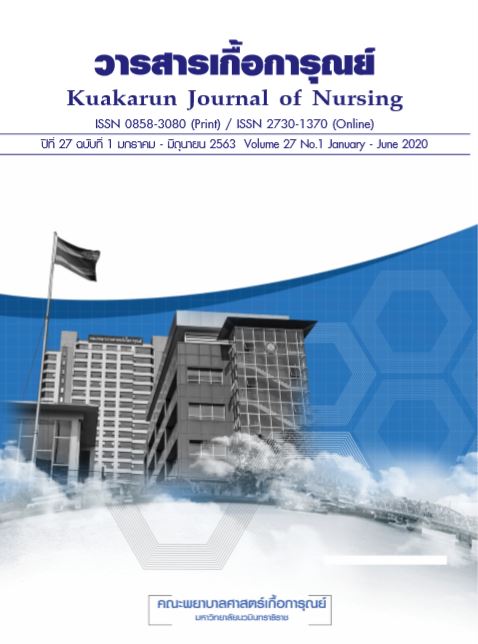ภาระในการดูแลและปัญหาสุขภาพจิตของผู้ดูแลผู้สูงอายุระยะประคับประคองที่บ้าน
คำสำคัญ:
ภาระในการดูแล, ปัญหาสุขภาพจิต, ผู้ดูแลหลัก, ผู้สูงอายุ, การดูแลแบบประคับประคองที่บ้านบทคัดย่อ
ผู้สูงอายุไทยที่อยู่ในระยะประคับประคองที่บ้านส่วนใหญ่เป็นผู้ป่วยติดเตียง ผู้ดูแลหลักจึงมักเน้น การดูแลแค่ด้านร่างกายแต่มองข้ามการดูแลด้านจิตใจทั้งของผู้ป่วยและผู้ดูแลหลักเอง อาจเนื่องด้วยระบบ การติดตามเยี่ยมบ้านก็เน้นไปด้านร่างกาย รวมทั้งขาดบุคลากรที่มีความเชี่ยวชาญทางสุขภาพจิตและ จิตเวชศาสตร์ไปร่วมในการดูแล การรับหน้าที่ดูแลผู้สูงอายุในระยะประคับประคองนั้นเป็นการดูแลที่ต้อง ทุ่มเท เสียสละอย่างหนักด้วยการดูแลตลอด 24 ชั่วโมง และมีความซับซ้อนในหลายด้าน ดังนั้น เมื่อผู้ดูแล เผชิญกับหน้าที่การดูแลผู้สูงอายุในระยะประคับประคองที่หนักหน่วง ความทุกข์ทรมานทางด้านจิตใจจึงเกิด ขึ้นโดยไม่รู้ตัวเอง ผู้ดูแลหลักจึงขาดการดูแลทางสุขภาพจิตของตนเองอย่างเหมาะสม หน้าที่ของ ผู้ดูแลดังกล่าวส่งผลให้เกิดปัญหาสุขภาพจิตตามมา การให้การพยาบาลผู้ดูแลหลักที่มีปัญหาสุขภาพจิตและ ความรู้สึกภาระในการดูแลจึงควรดูแลโดย (1) การประเมินความเครียดของผู้ดูแล คือ 1) ประเมินโดย แบบวัด และ 2) การสัมภาษณ์และการสังเกต (2) การจัดการความเครียดของผู้ดูแลหลักคือ 1) การตอบสนอง ความต้องการด้านร่างกาย 2) การจัดการความทุกข์ทรมานด้านอารมณ์ในผู้ดูแลหลัก ได้แก่ ภาวะซึมเศร้าและ ความเครียดโดยส่งเสริมความมีคุณค่าในตนเองของผู้ดูแลหลัก และสนับสนุนให้ระบายความรู้สึก ได้แก่ อารมณ์โกรธ รู้สึกผิด คับข้องใจและอารมณ์อื่น ๆ รวมทั้งการให้กำลังใจเพื่อลดความรู้สึกที่ไม่ดี ภาระในการดูแลและ ปัญหาสุขภาพจิตในผู้ดูแลหลักย่อมส่งผลต่อการดูแลผู้สูงอายุในระยะประคับประคองที่บ้านในทุก ๆ ด้าน ดังนั้น พยาบาลมีหน้าที่เชิงรุกที่ต้องใส่ใจผู้ดูแลผู้สูงอายุที่อยู่ในระยะประคับประคองที่บ้าน เพื่อลดภาระ ในการดูแลและปัญหาสุขภาพจิตเป็นการส่งเสริมและเพิ่มให้เกิดคุณภาพชีวิตของผู้สูงอายุและผู้ดูแลหลัก โดยเฉพาะอย่างยิ่งการตายดีและการตายอย่างสมศักดิ์ศรีความเป็นมนุษย์
เอกสารอ้างอิง
World Health Organization. Palliative care for older people: better practices [Internet]. 2011[cited 2015 Jul 17]. Available from: http://www.euro.who.int/__data/assets/pdf_file/0017/143153/e95052.pdf
Prasartkul P. Population aging and health: a case study of Thailand. In: the RGJ‐PhD Congress XIV; 2013 April 5; Institute for Population and Social Research, Mahidol University. (in Thai)
Milintarangul U. National policy on palliative care in Thailand. practices [Internet]. 2015 [cited 2015 Jul 17]. Available from: http://www.gogood.in.th/upload/article/F_39_1/pdf(in Thai)
Lunney JR, Lynn J, Foley DJ, Lipson S, Guralnik JM. Patterns of functional decline at the end of life. The Journal of the American Medical Association 2003;289(18):2387-92.
Milintarangul U. Growth of health care services in Thailand: what’s the gap?. palliative and end of life care in Thailand: where are we going?. In: the meeting of Mahidol University, Bangkok;2014 Oct; Mahidol University. (in Thai)
World Palliative Care Alliance, World Health Organization. Global atlas of palliative care atthe end of life [Internet]. 2014 [cited 2015 Jan 7]. Available f rom: https://www.who.int/nmh/Global_Atlas_of_Palliative_Care.pdf
Stajduhar KI. Burdens of family caregiving at the end of life. Clinical & Investigative Medicine2013;36(3):e121-e6.
Aggar C. Issues caring burden. Australian Nursing Journal 2012;20(5):35.
Gray R, Thapsuwan S, Thongcharoenchupong N, Pumsaithong P. Caregiving to older persons: happiness and stress. Bangkok: Amarin Printing & Publishing; 2013. (in Thai)
Supaporn K. Development of an ideal set of nursing care activities for home-based palliative care to enhance care quality and reduce caregiving burden among the family caregivers of Thai elderly [Dissertation]. Songkla: Prince of Songkla University; 2019. (in Thai)
Sherman DW, MaGuire DB, Free D, Cheon JY. A pilot study of the experience of family caregivers of patients with advanced pancreatic cancer using a mixted methods approach. Journal of Pain and Symptom Management 2014;48(3):385-99.
Limpawattana P, Theeranut A, Chindaprasirt J, Sawanyawisuth K, Pimporm J. Caregivers burden of older adults with chronic illnesses in the community: a cross-sectional study. Journal of Community Health 2013;38:40-5. (in Thai)
Grad J, Sainsbury P. Problem of caring for mentally ill at home. Proceeding of the Royal Society of Medicine 1966;59(1):20-3.
Zarit SH, Reever KE, Bach-Peterson J. Relatives of the impaired elderly: correlates of feelings of burden. Gerontologist 1980;20(6):649-55.
Zarit SH. The memory and behavior problems checklist and the burden interview [Internet].1990 [cited 2015 Jul 17]. Available from: https://books.google.co.th/books/about/The_Memory_and_Behavior_Problems_Checkli.html?id=zchEngEACAAJ&redir_esc=y
Flaskerud JH, Carter PA, Lee P. Distressing emotions in female caregivers of people with AIDS, age-related dementias, and advanced-stage cancers. Perspectives in Psychiatric Care 2000;36(4):121-30.
Rodger D, O Neill, Nugent L. Informal carers’ experiences of caring for older adults at home: aphenomenological study. British Journal of Community Nursing 2015;20(6):280-5.
Girgis A, Lambert S, Johnson C, Currow D. Physical, psychosocial, and economic burden ofcaring for people with cancer: a review. American Society of Clinical Oncology 2013;9(4):197-202.
Toonsiri C, Sunsern R, Lawang W. Development of t he burden interview for caregivers of patients with chronic illness. Journal of Nursing and Education 2011;4(1):62-75. (in Thai)
Corless IB. Bereavement. In: Ferrell BR, Coyle N, editors. Oxford textbook of palliative nursing. 3rd ed. New York: Oxford University Press; 2010. p. 597-611.
McMillan SC, Small BJ. Using the cope intervention for family caregivers to improve symptomsof hospice homecare patients: a clinical trial. Oncology Nursing Forum 2007;34:313-21.
Sanderson C, Lobb EA, Mowll J, Butow PN, McGowan N, Price MA. Signs of post-traumatic stress disorder in caregivers following an expected death: a qualitative study. Palliative Medicine 2013;27(7):625-31.
Hudson P, Quinn K, Kristjanson L, Thomas T, Braithwaite M, Fisher J, et al. Evaluation of a psycho-educational group programme for family caregivers in home-based palliative care. Palliative Medicine 2008;22(3):270-80.
Walsh K, Jones L, Mason C, McLoughlin J, Blizard R, King M. Reducing emotional distress in people caring for patients receiving specialist palliative care: randomised trial. British Journal of Psychiatry 2007;190:142-7.
McMillan SC, Small BJ. Using the cope intervention for family caregivers to improve symptoms of hospice homecare patients: a clinical trial. Oncology Nursing Forum 2007;34(2):313-21.
Allen RS, Hilgeman MM, Ege MA, Shuster JL, Burgio LD. Legacy activities as intervention approaching the end of life. Journal of Palliative Medicine 2008;11(7):1029-38.

















